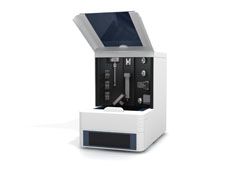Resetting the standard in LC autosampling
Spark Holland Product Profile

Packed with features, the IntegrityTM autosampler from leading supplier, Spark Holland, has been designed for optimum care of precious samples. Innovative sample barcode identification technology ensures better control of sample tracking – 1D and 2D sample and tray identification codes can be read, filed and linked to sample assay results. Injection performance monitoring verifies that the injection itself has been performed correctly. Integrity even checks for needle obstruction and missing vials before injecting a sample.
Spark’s concept of closed line sampling using pressure assisted sample aspiration directly from vial to valve has been specially developed for handling small samples, carryover and compatibility with UHPLC. A separate needle wash pump for better needle wash and faster injection cycles enable an entire injection-wash cycle in less than 20 seconds. Vial bottom detection facilitates efficient use of available sample volume and the microlitre-pick-up mode reduces sample loss to zero.
Integrity features advanced reagent addition and derivatisation, in addition to integrated online sample prep capabilities. With full software control, and compatible with UHPLC systems up to 120MPa (18,000 PSI), Integrity provides complete flexibility in LC autosampling capability.
Setting a new standard in sample care, the Integrity is the latest addition to Spark’s range of renowned autosamplers – Alias, Optimas and Reliance.
www.sparkholland.cominfo@sparkholland.com

Fundamentals of Benchtop GC–MS Data Analysis and Terminology
April 5th 2025In this installment, we will review the fundamental terminology and data analysis principles in benchtop GC–MS. We will compare the three modes of analysis—full scan, extracted ion chromatograms, and selected ion monitoring—and see how each is used for quantitative and quantitative analysis.
Characterizing Plant Polysaccharides Using Size-Exclusion Chromatography
April 4th 2025With green chemistry becoming more standardized, Leena Pitkänen of Aalto University analyzed how useful size-exclusion chromatography (SEC) and asymmetric flow field-flow fractionation (AF4) could be in characterizing plant polysaccharides.
This information is supplementary to the article “Accelerating Monoclonal Antibody Quality Control: The Role of LC–MS in Upstream Bioprocessing”, which was published in the May 2025 issue of Current Trends in Mass Spectrometry.




